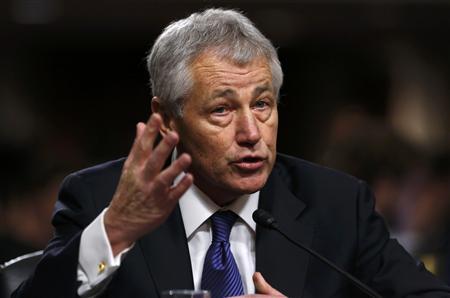
The United States said on Tuesday it will deliver 10 Apache attack helicopters to Egypt, relaxing a partial suspension of aid imposed after Egypt's military ousted President Mohamed Mursi last year and cracked down violently on protesters.
US Defense Secretary Chuck Hagel informed his Egyptian counterpart of the decision, which will help Egypt's counter-terrorism operations in the Sinai Peninsula, the Pentagon said.
"We believe these new helicopters will help the Egyptian government counter extremists who threaten US, Egyptian, and Israeli security," Pentagon spokesman Rear Admiral John Kirby said in a statement, recounting Hagel's conversation with Egyptian Defense Minister Colonel Sedki Sobhi.
Secretary of State John Kerry had paved the way by certifying to Congress that Egypt met key criteria for Washington to resume some aid.
Those criteria included Egypt "upholding its obligations under the Egypt-Israel Peace Treaty," the State Department said.
But Kerry noted in a call with his counterpart that he was not yet able to certify that Egypt was taking steps to support a democratic transition.
One US official, speaking on condition of anonymity, said no other military aid beyond the Apaches, built by Boeing Co., was being freed up at the moment. That meant that delivery of other hardware, like F-16 fighter jets produced by Lockheed Martin Corp, remained on hold.
In a call with Egypt's foreign minister, Kerry "urged Egypt to follow through on its commitment to transition to democracy – including by conducting free, fair, and transparent elections," State Department spokeswoman Jen Psaki said.
That could send a signal to Egypt ahead of next month's presidential election, which Abdel Fattah al-Sisi, the former army general who deposed Mursi, is expected to win.
Kerry also called on Egypt to ease restrictions on freedom of expression, assembly, and the media, she said.
Still, the move to free up the delivery of the Apaches underscores the importance that Washington places on ties with Egypt, which for decades has been among the largest recipients of US military and economic aid because of its 1979 peace treaty with US ally Israel.
US Representative Kay Granger, a Texas Republican who heads the House of Representatives subcommittee overseeing foreign aid, said she was encouraged by the decision.
"I have continued to advocate for Egyptians to have the tools necessary to stabilize the economy and keep the country secure, including equipment that assists with counter-terrorism operations in the Sinai," Granger said in a statement.
Still, the US move may stoke concern among rights advocates. Human Rights Watch earlier this month cautioned Washington against resuming military assistance until the Egyptian government ended alleged rights abuses and held violators accountable.




